HighPoint's RocketU 1144A PCIe x4 USB 3.0 Controller: A Big Back-end
by Zach Throckmorton on August 30, 2011 8:26 AM ESTWhile most current-gen motherboards ship with at least two USB 3.0 ports, many users either have no USB 3.0 ports at all or two ports simply aren't enough. Almost all PCIe USB 3.0 controller cards available today use the PCIe x1 interface, with a maximum bandwidth of 5Gbps. Furthermore, these PCIe x1 USB 3.0 controller cards split multiple USB 3.0 ports between one 5Gbps USB 3.0 controller - so if you're using a single USB 3.0 controller PCIe x1 expansion card with four ports, and you're using all four ports, each port's maximum bandwidth is 1.25Gbps. HighPoint's RocketU 1144A offers a PCIe x4 interface and therefore a 20Gbps back-end - and each of its four USB 3.0 ports has its own Asmedia ASM104x USB 3.0 controller, so each port can provide 5Gbps potential bandwidth.
The SATA II interface's maximum bandwidth is 3Gbps, and the latest SATA III standard maxes out at 6Gbps. While most devices are incapable of saturating these interfaces, higher-performance SSDs and SSD arrays can often deliver in excess of 1Gbps. Transferring data between multiple internal SSDs and SSD arrays to multiple external USB 3.0 SSDs or HDD arrays simultaneously can potentially choke a PCIe x1 interface.
Testing the RocketU
Given the massive theoretical bandwidth promised by the RocketU 1144A, we wanted to see if we could find its real world limits. The card installed easily and installing the software and drivers also proceeded without issue. First, I grabbed the best-performing USB 3.0 flash drives from our recent USB 3.0 flash drive round up, the Patriot Supersonic Magnum, SuperTalent RC8, Patriot Supersonic, Mushkin Ventura Pro, and Kingston DataTraveler Ultimate. Unfortunately, due to the horizontal orientation and close placement of the ports on the HighPoint controller card, I was only able to use three of the smaller drives for the test.
Inserting two of even the smallest USB 3.0 flash drives into the controller card's adjacent ports requires forcing and wedging them into position.
Unsurprisingly, Iometer indicates even our fastest flash drives are nowhere near capable of filling the RocketU's bus - not even when all three are utilized simultaneously:
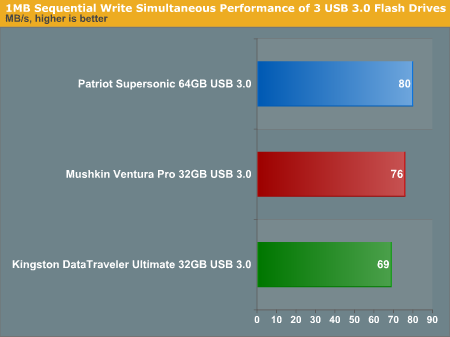
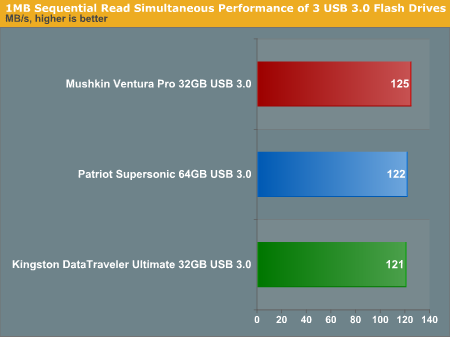
All of these simultaneous transfer rates are essentially identical to our results testing each drive individually, one at a time. Note that testing two of these drives simultaneously in a two USB 3.0 port enabled motherboard yielded the same results.
The fastest USB 3.0 flash drives are nowhere near as fast as the fastest SSDs. So we hooked up both Patriot's Pyro 120GB and Corsair's Force GT 120GB SSDs, which Anand reviewed a few weeks ago. Each drive was attached via a USB 3.0 dock. Because USB cables are smaller than flash drives, we were able to simultaneously test two flash drives and two SSDs. Iometer indicates we're still not approaching the RocketU controller card's capacity:
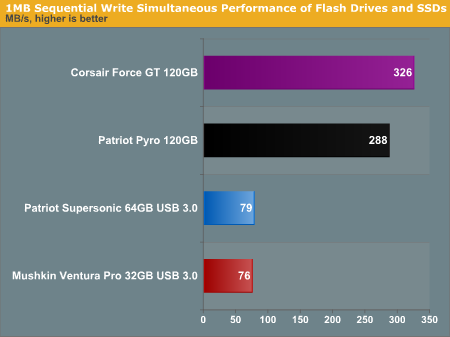
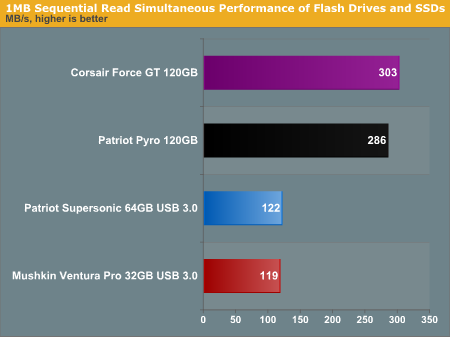
Again, not even two flash drives and two SSDs can saturate the RocketU's bus. Then again, two SSDs can't saturate the bus of a two USB 3.0 port enabled motherboard, either.
An individual SSD isn't as fast as two (or more) SSDs configured in RAID 0. We inserted two USB 3.0 flash drives as well as the Patriot Pyro and Corsair Force GT SSDs in (basic Windows 7 software) RAID 0 into the RocketU.
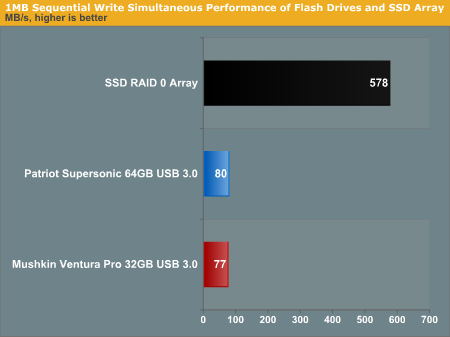
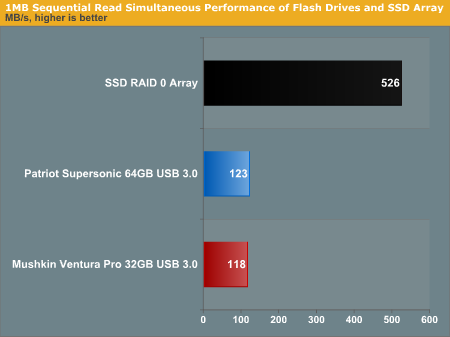
Even the two of the fastest SSDs in RAID 0 and two of the fastest USB 3.0 flash drives don't choke the RocketU. That said, the two SSD RAID 0 array performs similarly on a two USB 3.0 port enabled motherboard.
Conclusions
HighPoint's RocketU 1144A is available from Amazon right now for less than $100. While four USB 3.0 port PCIe x1 controller cards aren't common, most models cost less than half as much as the RocketU. For typical home users, the HighPoint 1144A is likely overkill - there are adequate solutions available at lower cost. We couldn't even push it to its limits with one array of the fastest SSDs. However, if you are a power user with multiple internal and external SSD arrays (or large HDD arrays), then the 1144A is a compelling product. Of course, these conclusions are in the context of current hardware. As SSDs continue to get faster and faster, it wouldn't surprise me if, in a few years, there are affordable external SSDs that would work best with the 1144A.
I was pleased by the controller card's stability and functionality - despite repeated hot swapping of various devices, it never stopped recognizing anything, unlike many other controller cards and motherboards that sometimes require a system restart to resume functioning after repeated hot swapping. I was not pleased by the port placement - though multiple flash drive usage is not the intended usage pattern for the card, there might be times when you'd want to unhook your drive arrays and drop some data onto a bunch of flash disks. Regardless, HighPoint should be commended for bringing this product to market - it's always better to have capacity available and not need it than need it and not have it available!


_575px.JPG)








38 Comments
View All Comments
bji - Tuesday, August 30, 2011 - link
Sentence two should have been written as:"What logic concludes that two drives used drives used individually cannot transfer data as fast as the two drives in RAID 0?"
bji - Tuesday, August 30, 2011 - link
Obviously I have a typo even in the correction. Man I am tired today.Z Throckmorton - Tuesday, August 30, 2011 - link
Of course you are correct, you simply misinterpreted what I wrote. Individual implies one. That is, an individual drive isn't as fast as multiple drives in RAID 0. That's why I said individual instead of summed or total.bji - Tuesday, August 30, 2011 - link
There was no reason to put the drives into RAID 0 if it was not going to make their throughput higher since the purpose of adding devices and changing their configuration was to try to increase total throughput to stress the USB card. Therefore putting the SSDs into RAID 0 was counter to that purpose since it reduced the overall throughput of the devices.Also the comment that "Even the two of the fastest SSDs in RAID 0 and two of the fastest USB 3.0 flash drives don't choke the RocketU" further implies that the RAID 0 array of two drives was expected to have higher throughput than the two drives working individually.
Unless you were trying to test the throughput on one individual USB port, but that's not how the article was written.
Anyway, I'm being pedantic. It was a fine article.
ltcommanderdata - Tuesday, August 30, 2011 - link
It might be useful to include a direct comparison against a motherboard's own USB3.0 ports to show whether bandwidth saturation of PCIe x1 is common and significant in these scenarios.peternelson - Wednesday, August 31, 2011 - link
Asus suggest that it could be a restriction when using fast peripherals across a single lane backplane connection and I do find this plausible.That was the thinking behind their Asus U3S6 expansion card which has some similar features to this product and has been around a while now.
As well as increasing the link speed and going full duplex, the USB3 standard also increased the current available to devices.
I would quite like to see some supplementary power connector on the card (perhaps Molex) to avoid needing to draw all that power from the system backplane.
Radnor - Tuesday, August 30, 2011 - link
Hi Zach T.If you really want to test this controller, just Install a WS2008R2 ( Free Evaluation from MS Technet ) and assemble a Software Raid 0, with 4 decent Pen Drives. Might not be good for booting but some of would love to use a fast drive for alot of things. Or for just the sake of saturating that bus.
Thanks
blckgrffn - Tuesday, August 30, 2011 - link
Seriously, this looks good to go for a nice external disk array without all the fun and expense of a Thunderbolt setup.repoman27 - Tuesday, August 30, 2011 - link
Well, a single Thunderbolt port with two drive arrays connected to it would yield ~19% more throughput than this card with four individual SSDs connected to it.But since the cheapest Thunderbolt drive array is etailing for $949 right now and the only cable is going for $49, you're looking at $1996.00 worth of enclosures and cables. Or you could get four appropriate drive enclosures with cables and the HighPoint card for $205.91...
81% of the performance for 10% of the cost? Bah! I might need that extra 19% of bandwidth someday... or the ability to attach a high resolution display... or the ability to fit the card into a laptop...
repoman27 - Tuesday, August 30, 2011 - link
USB 3.0 and PCIe 2.0 share the same nominal data rate of 5 Gbps and both use 8b/10b encoding thus they are really 500 MB/s interfaces. However, the protocol overhead for USB 3.0 in a best case scenario is still way higher than that of PCIe 2.0 under normal circumstances (at least 20% vs. less than 10%). Therefore one dedicated PCIe 2.0 lane will always provide more than enough bandwidth for one USB 3.0 controller.A single SF-2281 SSD connected to a good SATA 6 Gbit/s to USB 3.0 bridge can saturate a single USB 3.0 host controller, as you demonstrated. The numbers you posted for the Corsair Force GT are much lower than the > 400 MB/s which that drive is capable of when connected directly to a SATA 6 Gbit/s controller. They are in fact though, some of the highest numbers I've ever seen posted for USB 3.0 throughput. You've saturated USB 3.0 way before coming close to the marketing bullshit number of "5 Gbps". As controllers and drivers mature and are further tweaked we might see throughput closer to 400 MB/s over USB 3.0, but for now it looks like 326 MB/s is all she wrote.
I'm not sure why you bothered with USB flash drives for this review, or why you tried to cram them into adjacent ports. It would have been more in keeping with this site to use four separate SF-2281 drives, each with their own SATA 6 Gbit/s to USB 3.0 bridge, connected to each of the 4 ports on the RocketU 1144A to see what this card was really capable of. Also, this could have been used to demonstrate the further impact of USB 3.0 on storage system performance beyond just sequential reads and writes.